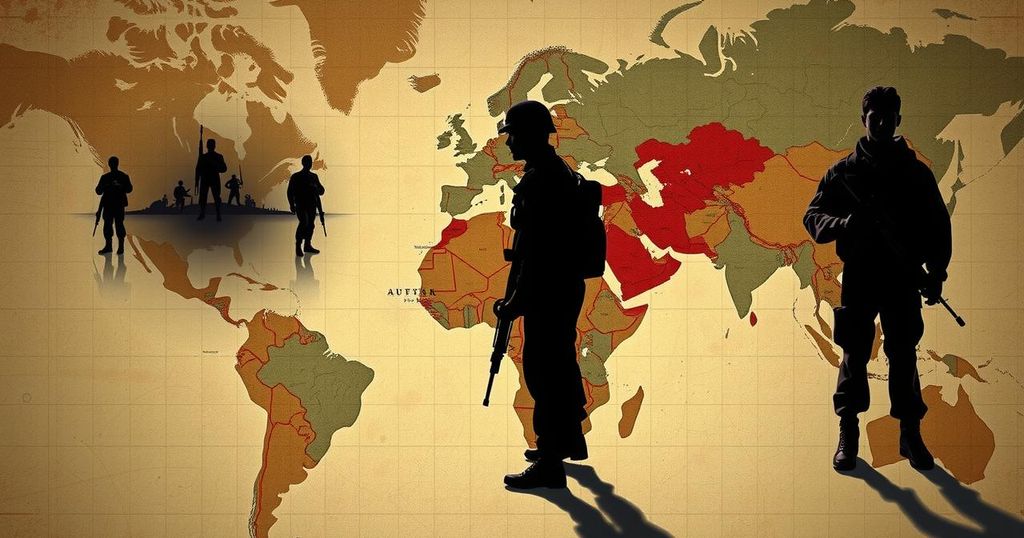World news
ASIA, BIDEN ADMINISTRATION, DEFENSE, DONALD TRUMP, ENERGY INFRASTRUCTURE, EUROPE, EUROPE/ASIA, KOREA, NORTH, KURSK, MILITARY, NATIONAL INTELLIGENCE SERVICE, PYONGYANG, RUSSIA, TRUMP, UKRAINE, US DEPARTMENT OF DEFENSE, US DEPARTMENT OF STATE, US NATIONAL SECURITY COUNCIL, WAR, WEST
Jamal Robinson
0 Comments
The Withdrawal of North Korean Soldiers: Uncertainties in the Ukraine Conflict
Ukrainian and Western authorities report that North Korean soldiers in Russia’s Kursk region have likely withdrawn after experiencing high casualties. Although this retreat follows significant international interest and may suggest a strategic shift, it raises questions regarding North Korea’s potential future military actions. Reports of troop involvement have been complicated by misinformation and changing political contexts, diminishing the effectiveness of propaganda efforts.
Recent reports indicate that North Korean soldiers present in Russia’s Kursk region may have withdrawn after suffering significant casualties. Ukrainian military officials estimate that 11,000 North Korean troops participated, with reports suggesting that up to 40% faced death, injury, or capture. Experts note that this withdrawal may not be indefinite as North Korea could be preparing for potential future deployments.
The presence of North Korean soldiers in Ukraine had previously gained attention following confirmation from South Korea’s National Intelligence Service on October 18, 2024. However, their presence appears to be receding, coinciding with the inauguration of US President Donald Trump, who has advocated for a speedy resolution to the conflict. This timing may reflect a strategic maneuver by North Korea and Russia to bolster their negotiation stance.
Although neither North Korea nor Russia officially confirmed the deployment of North Korean troops, their ambiguous handling of the situation seems intended to manipulate public perception and strengthen their bargaining power against the US. As both nations navigate this complex geopolitical landscape, the question remains as to how their agendas will unfold amid international pressures.
Ukraine’s response to the North Korean troop deployment has evolved, with diminishing propaganda effectiveness since Trump took office. Previously, reports aimed to galvanize US support for Ukraine by painting North Korea’s involvement as a threat. Interestingly, while Ukraine disseminated information to further its political aims, it did not seek extensive cooperation with South Korea regarding the details of the troop deployment, resulting in the circulation of misinformation.
Discrepancies in reporting have surfaced, with former US Secretary of Defense Lloyd Austin stating he had “not seen significant reporting” of North Korean troops in active combat situations. In stark contrast, various media outlets reported numerous engagement stories, some of which later turned out to be exaggerated or fabricated. Instances include claims of heavy casualties among North Korean forces, videos allegedly depicting their combat experiences, and sensationalized narratives that fueled media portrayal.
The narrative surrounding North Korean soldiers in Ukraine lacks clarity, compounded by the spread of inaccurate information. The changing political landscape, including Trump’s inauguration and the impeachment of South Korea’s President Yoon Suk-yeol, has further complicated the discourse. As propaganda efforts wane, both Ukraine and South Korea struggle to maintain interest in the North Korean troop issue.
Given the prevalence of misinformation, distinguishing reality from perception in global politics remains a profound challenge. Despite rumors and unverified reports, the fundamental question of the fate and impact of North Korean soldiers in Ukraine lingers unanswered, illustrating the complexity of warfare and international relations today.
The involvement of North Korean soldiers in the Ukraine conflict has raised significant international concern. Initially confirmed by South Korea’s intelligence, their participation hinted at an emerging alliance between North Korea and Russia, igniting debates about the geopolitical implications. As the situation evolves, the narratives surrounding these soldiers have been marred by misinformation, revisiting the challenges of verifying military actions in contemporary warfare.
In summary, the situation regarding North Korean soldiers deployed to Ukraine reflects a complex interplay of military engagement, misinformation, and international diplomacy. As Ukraine and South Korea grapple with declining propaganda effectiveness, the reality of North Korean troop involvement remains obscured by conflicting narratives. The evolving dynamics among Ukraine, North Korea, and the US promise future developments that warrant careful observation and analysis.
Original Source: english.hani.co.kr




Post Comment